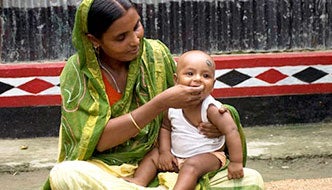 Rensselaer has received a grant from the Bill & Melinda Gates Foundation for the purpose of supporting the healthy birth, growth, and development (HBGD) initiative, which seeks to integrate multidisciplinary data to understand more fully the effects of risk factors on growth outcomes and to develop effective solutions that improve worldwide child health.
Rensselaer has received a grant from the Bill & Melinda Gates Foundation for the purpose of supporting the healthy birth, growth, and development (HBGD) initiative, which seeks to integrate multidisciplinary data to understand more fully the effects of risk factors on growth outcomes and to develop effective solutions that improve worldwide child health.
According to the United Nations Children’s Fund (UNICEF), more than a quarter of children under age 5 worldwide are permanently “stunted” due to malnutrition. The damage done to a child’s body and brain caused by a lack of nutrition may increase morbidity, mortality, physical impairment, and cognitive impairment. Stunted growth in children may limit productivity and increase poverty. Impaired growth and development are complex, multidisciplinary problems that involve diverse issues including nutritional deficiencies, infectious diseases, enteric health, water, and sanitation.
“By using advanced analytical, visualization, modeling, and semantic web informatics methodologies to extract information from multiple data sources, Rensselaer and HBGD researchers will assess causal relationships and quantify risk factors in order to develop novel hypotheses and targeted approaches to impact the health of children,” said President Shirley Ann Jackson. “Rensselaer is in a unique position to collaboratively design best practice ontologies and refine them as needed by virtue of the expertise of inventors, data scientists, and researchers here who are experienced at using semantic web methodologies in numerous interdisciplinary science settings.”
The $172,124 grant provides support for developing program-relevant ontologies and a set of semantic services to guide integration of relevant data to support a wide range of analyses, and predictive modeling activities to identify the intervention packages most effective and efficient for promoting healthy birth, growth, and development in vulnerable populations.
“At Rensselaer, we are developing the science behind data science―extracting unprecedented value and information from data, and bridging the gaps between analytics, modeling, and simulation to apply critical technologies to improving everyday life and meeting the most pressing challenges of our time.”—Curt Breneman
The research will lead to new insights into how and when data can be most effectively integrated and how information in the data can be inferred from the semantics, or extracted using advanced analytic procedures, to develop effective solutions and an infrastructure that has the potential to be used by any project integrating scientific data and quantitative analyses across diverse data sets. Once developed, this new infrastructure has the potential to form the basis for an even larger and more impactful partnership between Rensselaer and the foundation to identify the root causes and best solutions for addressing the serious problem of childhood stunting in developing nations.
“At Rensselaer, we are developing the science behind data science extracting unprecedented value and information from data, and bridging the gaps between analytics, modeling, and simulation to apply critical technologies to improving everyday life and meeting the most pressing challenges of our time,” said Curt Breneman, dean of the School of Science and administrative leader of the grant. “This growing relationship with the Bill & Melinda Gates Foundation is a tangible manifestation of the vision of Rensselaer as The New Polytechnic: a university that serves as a crossroads for exceptional people across disciplines, sectors, and geographical regions, and encourages collaboration by uniting a multiplicity of perspectives—as well as the most advanced tools and technologies—in order to address great global challenges.”
Rensselaer technical leader for the project is Deborah McGuinness, Tetherless World Senior Constellation Professor, and a member of The Rensselaer Institute for Data Exploration and Applications (IDEA) senior leadership committee. “The Rensselaer team will support the semantic integration, ontology formation, provenance capture, and visualization to better understand when and how to integrate data for analytic applications. In addition, we will use descriptive multi-way analytics coupled with machine learning methods to hypothesize and explain relationships between growth and development trajectories, covariates, and outcomes,” said McGuinness.
Rensselaer faculty members Kristin Bennett, professor in the Department of Mathematical Sciences, John Erickson, deputy director of the Web Science Research Center of the Tetherless World Constellation, Bulent Yener, professor of computer science and director of the Data Science Research Center, and graduate students will collaborate with McGuinness on the project.


